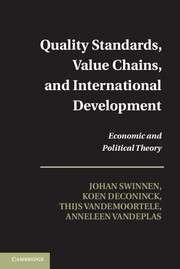Book contents
- Frontmatter
- Contents
- Preface and Acknowledgments
- 1 Introduction
- 2 Modeling Standards
- 3 Efficiency and Equity Effects of Standards
- 4 The Political Economy of Standards and Development
- 5 International Trade and Standards
- 6 Risk, Externalities, and the Nature of Standards
- 7 Endogenous Private and Public Standards in Value Chains
- 8 Butterflies and Political Economy Dynamics in Standard Setting
- 9 The Political Economy of Standards and Inclusion in Value Chains
- 10 Standards, Production Structure, and Inclusion in Value Chains
- 11 Standards, Market Imperfections, and Vertical Coordination in Value Chains
- 12 Market Power and Vertical Coordination in Value Chains
- 13 Price Transmission in Value Chains
- 14 Commodity Characteristics and Value Chain Governance
- 15 Economic Liberalization, Value Chains, and Development
- 16 Standards and Value Chains with Contracting Costs: Toward a General Model
- 17 General Equilibrium Effects of Standards in Value Chains
- References
- Index
9 - The Political Economy of Standards and Inclusion in Value Chains
Published online by Cambridge University Press: 05 August 2015
- Frontmatter
- Contents
- Preface and Acknowledgments
- 1 Introduction
- 2 Modeling Standards
- 3 Efficiency and Equity Effects of Standards
- 4 The Political Economy of Standards and Development
- 5 International Trade and Standards
- 6 Risk, Externalities, and the Nature of Standards
- 7 Endogenous Private and Public Standards in Value Chains
- 8 Butterflies and Political Economy Dynamics in Standard Setting
- 9 The Political Economy of Standards and Inclusion in Value Chains
- 10 Standards, Production Structure, and Inclusion in Value Chains
- 11 Standards, Market Imperfections, and Vertical Coordination in Value Chains
- 12 Market Power and Vertical Coordination in Value Chains
- 13 Price Transmission in Value Chains
- 14 Commodity Characteristics and Value Chain Governance
- 15 Economic Liberalization, Value Chains, and Development
- 16 Standards and Value Chains with Contracting Costs: Toward a General Model
- 17 General Equilibrium Effects of Standards in Value Chains
- References
- Index
Summary
Introduction
As demonstrated in Chapter 3, standards may have heterogeneous effects on different groups of producers. Chapter 7 analyzed this for the “vertical” case where different actors along the value chain had potentially opposing interests. In this chapter, we extend the analysis of heterogeneous effects of standards to the “horizontal” case where standards allow only a subset of all companies or households to be included at a certain stage in the value chain. Examples of such standards include occupational licenses (Kleiner, 2000), the practices of the medieval guild systems (Ogilvie, 2014), or geographical indications (GI), collective labels backed by government regulation to certify the geographical origins of a product (Moschini et al., 2008). GI regulations delineate the area for which the label applies, thus including or excluding producers on the basis of their location. In all these cases, the standard explicitly determines which producers are included in the value chain.
The selection of a subset of producers in a value chain can also occur as the result of private standards, as we discuss in Chapter 10. However, the case analyzed here concerns the selection of a subset of producers by the government. In some cases, the implementation of the public standard may depend on nongovernmental bodies. Occupational licensing, for instance, often happens through a nongovernmental licensing board, but members of this board are typically political appointees, and the exclusion of non-licensed producers is only effective because it is sanctioned by government (Kleiner, 2000).
Such exclusionary public standards are often justified by reference to an indirect positive effect on quality. To the extent that such a positive quality effect exists, the standard may thus have efficiency effects. However, obviously, the explicit inclusion or exclusion of producers causes distributional issues, which will in turn influence the political process of deciding on the size of the population of “insiders.” A crucial question is therefore how large the population of insiders should be, and how the political process determines the actual population.
This chapter develops a political economy model to analyze such issues. Our analysis makes four assumptions. First, the decision over the size of the population of insiders is taken by government bodies that may be influenced by various interest groups. Second, the group of insiders organizes some common activities that lead to both variable and fixed costs. Examples would be common marketing or training activities.
- Type
- Chapter
- Information
- Quality Standards, Value Chains, and International DevelopmentEconomic and Political Theory, pp. 122 - 141Publisher: Cambridge University PressPrint publication year: 2015



